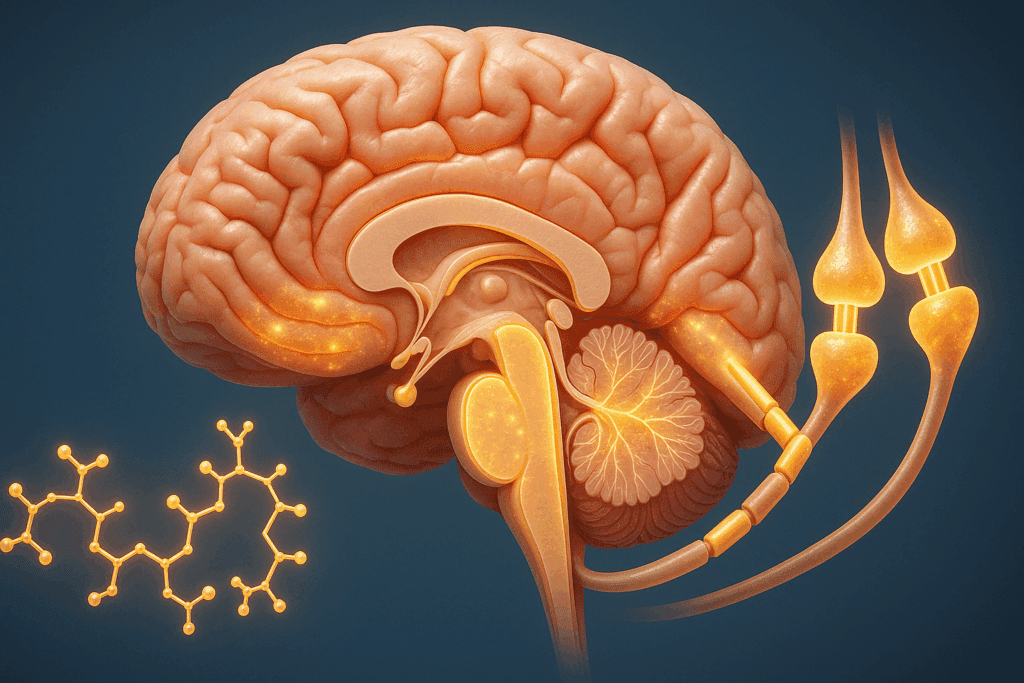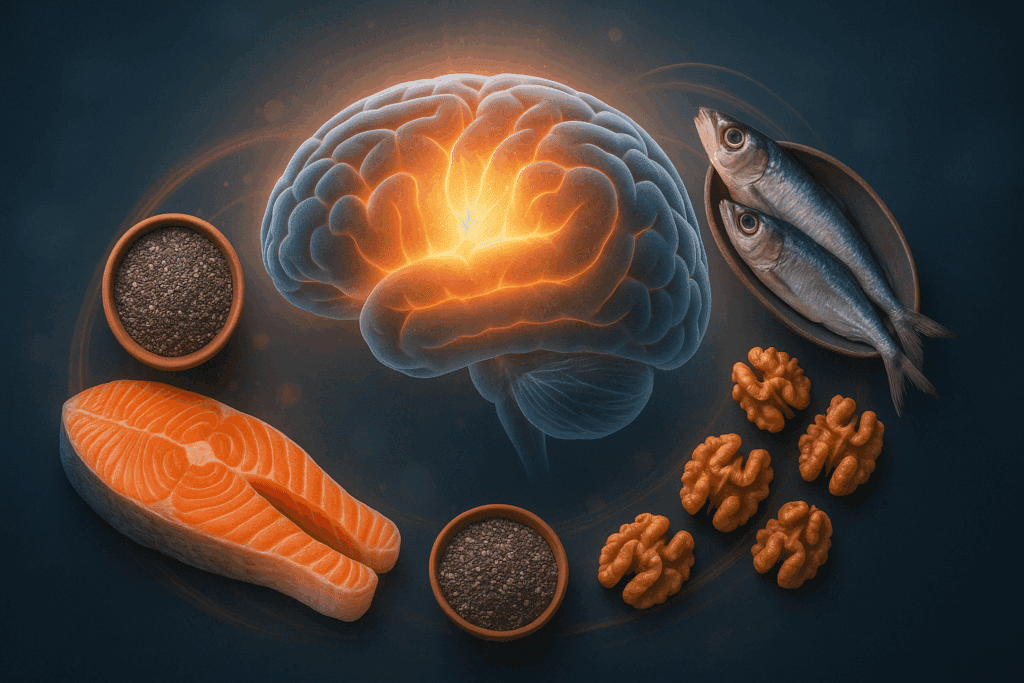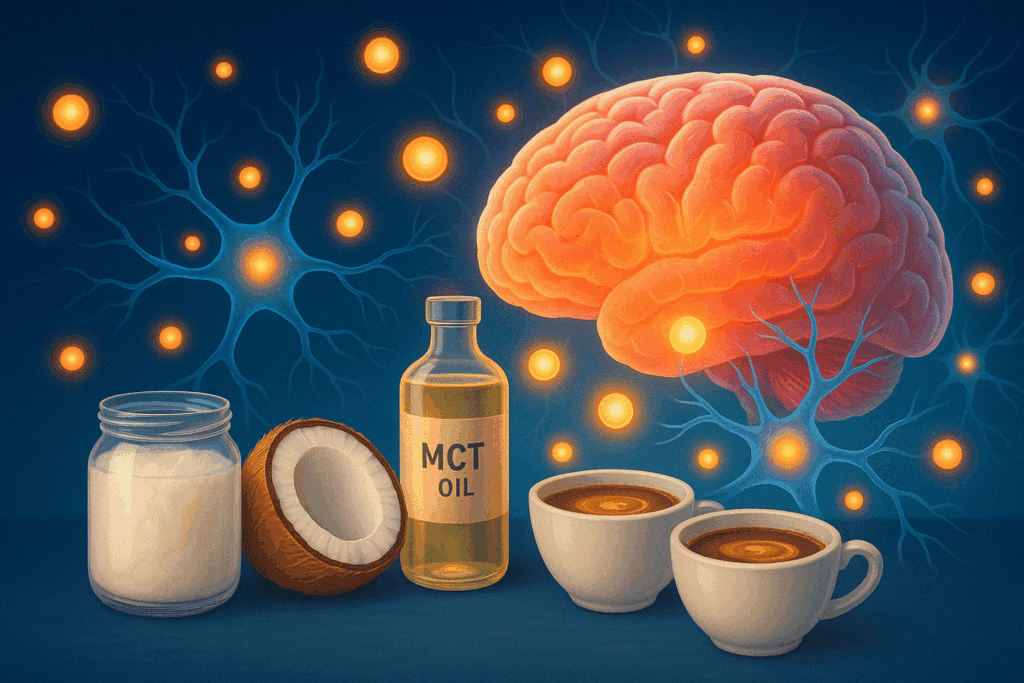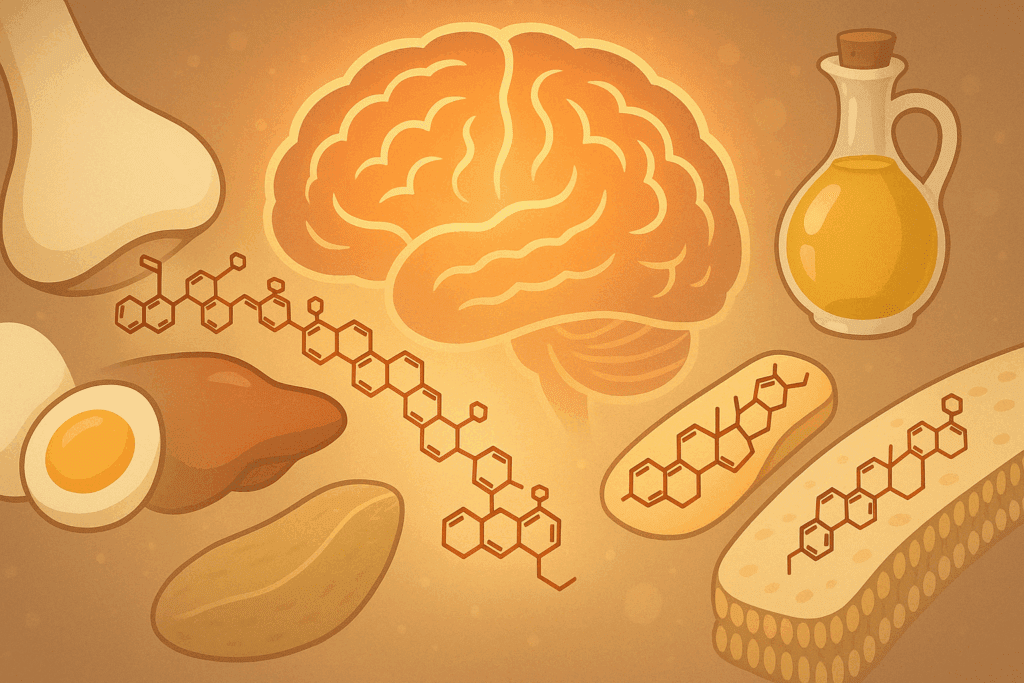In the modern pursuit of peak mental performance, few topics have garnered as much attention as brain nutrition. Yet amid the buzz surrounding nootropics, memory hacks, and productivity apps, one fundamental and science-backed truth continues to stand out: the human brain is made up of nearly 60% fat. This biological fact underscores a vital reality—fats for the brain are not merely a dietary consideration, but an essential component of cognitive function itself. Brain healthy fats, when sourced from the right foods, play a powerful and often underestimated role in supporting not just memory and learning, but also sustained attention and complex decision-making.
You may also like: How to Choose the Best Brain Supplements for Adults: Science-Backed Ingredients That Support Focus, Memory, and Mental Clarity
This article explores the intricate relationship between healthy fats for brain health and the enhancement of executive functions such as focus and decision-making. Drawing upon peer-reviewed research and expert insights, we’ll dive deep into how fat for brain health contributes to the biochemical integrity of neural pathways, the modulation of inflammation, and the optimization of neurotransmitter systems. We’ll also identify key dietary sources of these fats and explain how to integrate them into a daily routine for cognitive enhancement that feels as natural as it is effective.

Understanding the Brain’s Fatty Architecture
Before examining how healthy fats influence cognition, it’s important to grasp the structure and makeup of the brain itself. Roughly three-fifths of the human brain consists of fat, with the bulk of it found in neuronal membranes and myelin sheaths—the protective layers that insulate nerve fibers and speed up electrical communication. Among the most critical of these brain healthy fats are long-chain polyunsaturated fatty acids, particularly docosahexaenoic acid (DHA), a type of omega-3 fat.
DHA is a foundational component of the brain’s gray matter and synaptic membranes. It ensures that neurons remain fluid and flexible, which in turn supports rapid signal transmission and neural plasticity—two qualities essential for learning and memory retention. Without an adequate intake of these key fats for the brain, the cellular scaffolding that supports cognition becomes compromised, resulting in slower information processing and impaired focus. The structure-function relationship here is crucial: a brain rich in quality fat is primed for efficiency, while a brain starved of fat may struggle under cognitive demand.
The Role of Omega-3s in Focus and Decision-Making
Among the different classes of fats for the brain, omega-3 fatty acids are arguably the most celebrated. Found in fatty fish like salmon, mackerel, sardines, and plant-based sources such as flaxseeds and chia seeds, omega-3s—specifically EPA (eicosapentaenoic acid) and DHA—have been linked to improvements in attention, working memory, and emotional regulation.
Scientific literature has shown that individuals who consume higher levels of omega-3s tend to have denser gray matter in brain areas related to decision-making, such as the prefrontal cortex. This increased density is not merely structural; it corresponds with heightened performance in tasks requiring planning, impulse control, and sustained attention. In both children and adults, supplementation with DHA has demonstrated significant improvements in attention span, particularly in those with ADHD or executive function deficits.
Furthermore, omega-3 fatty acids appear to modulate dopamine signaling, a key neurotransmitter pathway involved in motivation and reward-based decision-making. This biochemical connection suggests that healthy fats for brain health not only support structural integrity but also enhance the functional neurochemistry underlying critical thinking and behavior regulation.
Fat as a Source of Sustained Brain Energy
One of the often-overlooked benefits of brain healthy fats lies in their role as a stable, long-lasting source of energy. Unlike carbohydrates, which cause sharp fluctuations in blood glucose levels and can lead to mental fog or crashes, fats provide a steady stream of fuel that supports prolonged mental effort. This is particularly relevant during cognitively demanding tasks, such as writing, analytical problem-solving, or strategic planning.
Medium-chain triglycerides (MCTs), found abundantly in coconut oil, are rapidly metabolized by the liver into ketones—a highly efficient energy source for the brain. Ketones can cross the blood-brain barrier and serve as an alternative to glucose, especially during periods of fasting or carbohydrate restriction. This makes MCTs a compelling form of fat for brain health, particularly for those interested in optimizing focus and endurance throughout the workday without the stimulant-dependency of caffeine or sugar.
Emerging research even suggests that ketones generated from MCTs may protect against age-related cognitive decline by reducing oxidative stress and inflammation in the brain. This adds another layer to the growing body of evidence that fats for the brain are not just about short-term focus, but also about long-term cognitive resilience.
Anti-Inflammatory Effects of Brain Healthy Fats
Chronic low-grade inflammation has emerged as a central theme in a wide array of neurological conditions, including depression, anxiety, and Alzheimer’s disease. The brain is particularly sensitive to inflammatory damage due to its high metabolic activity and dense concentration of vulnerable lipid-rich tissues. This is where healthy fats for brain health truly shine.
Omega-3 fatty acids are potent anti-inflammatory agents that work by downregulating pro-inflammatory cytokines and upregulating anti-inflammatory compounds such as resolvins and protectins. These bioactive molecules not only protect neurons from degeneration but also facilitate recovery and repair processes following stress or injury. By creating an internal environment that is less hostile to neuronal function, these fats effectively enhance the brain’s ability to concentrate, solve problems, and make rational decisions under pressure.
Interestingly, populations with high omega-3 intake, such as those following Mediterranean or traditional Japanese diets, have shown lower rates of depression and cognitive decline, further supporting the idea that fat for brain health exerts protective as well as performance-enhancing effects.

The Connection Between Dietary Fat and Neurotransmitters
Neurotransmitters—chemical messengers like serotonin, dopamine, and acetylcholine—are essential for brain function, and their activity is profoundly influenced by dietary fat intake. The membranes of synaptic vesicles, which store and release neurotransmitters, are composed largely of phospholipids. These lipids rely on dietary fat sources to maintain their structural and functional integrity.
For instance, phosphatidylserine and phosphatidylcholine are two brain healthy fats found in egg yolks, soybeans, and organ meats that support acetylcholine production, a neurotransmitter associated with memory, alertness, and learning. Low levels of these phospholipids have been observed in individuals with cognitive impairment, indicating a potential link between dietary fat quality and neurotransmitter availability.
In addition, studies show that saturated fats, particularly from poor-quality sources like processed meats or fried foods, may have the opposite effect—promoting inflammation and interfering with neurotransmitter regulation. This underscores the importance of not just increasing fat intake, but choosing the right types of fats for brain health that support cognitive equilibrium rather than disrupt it.
Cholesterol: The Controversial Brain Fat
While cholesterol often gets a bad reputation in cardiovascular discussions, it plays an indispensable role in brain function. Nearly 25% of the body’s cholesterol is found in the brain, where it is critical for synapse formation and the maintenance of cell membranes. In fact, cholesterol is so vital to neural health that the brain manufactures its own, independent of dietary cholesterol levels.
Cholesterol is also essential for the synthesis of steroid hormones like cortisol and estrogen, which influence mood, stress response, and overall cognitive performance. In elderly populations, too little cholesterol has been associated with poor memory function and increased risk of dementia. This challenges the simplistic view that all fats, especially those linked with cholesterol, are harmful.
The takeaway is not to consume cholesterol indiscriminately, but to recognize that when balanced appropriately—especially alongside monounsaturated fats from olive oil, nuts, and avocados—it contributes positively to the complex matrix of fat for brain health.
Key Food Sources of Brain Healthy Fats
A practical approach to supporting cognitive health through diet starts with incorporating a diverse range of fats that support brain function. Fatty fish like salmon, anchovies, and herring are among the richest natural sources of EPA and DHA. For those seeking plant-based alternatives, algae oil supplements can offer a vegan-friendly dose of omega-3s.
Avocados, rich in monounsaturated fats and fiber, offer a stable energy source and have been associated with improved executive function in observational studies. Nuts and seeds—especially walnuts, flaxseeds, and chia seeds—deliver a mix of omega-3s, antioxidants, and vitamin E, all of which protect neurons from oxidative stress.
Eggs, particularly the yolks, provide choline, a precursor to acetylcholine, as well as phospholipids that nourish cell membranes. Finally, incorporating coconut oil or MCT oil into your routine can help generate brain-boosting ketones that enhance mental clarity and sustained focus.

Fat-Optimized Dietary Patterns for Cognitive Performance
Rather than focusing on isolated nutrients, many researchers now advocate for dietary patterns that naturally emphasize fats for the brain. The Mediterranean diet, for example, prioritizes olive oil, nuts, fish, and leafy greens while minimizing processed foods and sugars. Numerous longitudinal studies have linked adherence to this diet with improved cognitive performance, reduced risk of neurodegenerative disease, and better overall brain health.
Another compelling example is the ketogenic diet, which shifts the body’s metabolism to burn fat instead of carbohydrates. Originally developed to treat epilepsy, this high-fat, low-carb diet has shown promise in enhancing focus, stabilizing mood, and even improving symptoms of cognitive disorders. While it may not be suitable for everyone, cyclical or targeted ketogenic approaches may offer a cognitive edge, especially when guided by medical or nutritional professionals.
Importantly, any dietary pattern aiming to support fat for brain health should also emphasize quality—choosing unprocessed, whole-food sources of fat over industrial seed oils or trans fats, which are linked to inflammation and cognitive impairment.
How to Incorporate Brain Healthy Fats Into Your Routine
Incorporating more healthy fats for brain health into your daily meals doesn’t have to be complicated. Start the day with a breakfast of eggs cooked in olive oil, paired with avocado toast on whole-grain bread. Add ground flaxseed or chia seeds to smoothies for a boost of plant-based omega-3s. Snack on a handful of walnuts or almonds, and drizzle MCT oil into coffee or tea to support ketone production and sustained mental energy.
For lunch and dinner, aim to include fatty fish at least two to three times per week, and use olive oil as your primary cooking fat. Experiment with global cuisines that naturally emphasize these foods—such as Mediterranean, Japanese, and Scandinavian diets—to keep things both enjoyable and brain-nourishing.
By making these dietary choices consistent and intentional, you’re not just feeding your body—you’re fueling your mind in a way that enhances clarity, responsiveness, and the ability to make well-reasoned decisions in a complex world.

Frequently Asked Questions (FAQ) on Healthy Fats for Brain Health
1. How does the balance between omega-3 and omega-6 fats affect cognitive function?
Maintaining the right ratio between omega-3 and omega-6 fats is essential for supporting mental clarity and long-term neurological health. While both are considered essential fats for the brain, an excess of omega-6—commonly found in processed vegetable oils—can promote inflammation, which may impair neurotransmission and memory retention. On the other hand, omega-3s like DHA and EPA are brain healthy fats known to reduce inflammation and support synaptic plasticity. Experts recommend a dietary ratio closer to 1:1 or 1:2 omega-3 to omega-6, but the modern Western diet often exceeds 1:20, which may contribute to cognitive decline. Improving this balance with more omega-3-rich foods and fewer processed oils is a practical step toward optimizing fat for brain health.
2. Can intermittent fasting impact how the brain utilizes fats for energy?
Yes, intermittent fasting can shift your brain’s energy metabolism toward ketone bodies, which are produced from fats and may offer neuroprotective effects. This metabolic switch is believed to enhance mitochondrial function and support the maintenance of brain cells, especially in aging individuals. In a fasting state, the body uses stored fat for brain health more efficiently, leading to increased mental clarity and potentially reducing the risk of neurodegenerative diseases. Some researchers suggest that fasting might also enhance the brain’s resilience to stress through improved autophagy and reduced oxidative damage. However, it’s crucial to ensure your fat sources during feeding periods include healthy fats for brain health, such as avocado, walnuts, and fatty fish.
3. What role do phospholipids play in maintaining brain cell membranes?
Phospholipids, particularly phosphatidylcholine and phosphatidylserine, are vital components of neuronal membranes and are derived from dietary fat for brain health. These specialized fats contribute to membrane fluidity, signal transmission, and overall cellular integrity. A decline in phospholipid content is observed in aging brains and has been linked to memory loss and decreased processing speed. Supplementation with phospholipid-rich foods like egg yolks, krill oil, and soy lecithin may help replenish these brain healthy fats. Unlike generic triglycerides, phospholipids integrate directly into the neural structure, highlighting the importance of dietary variety when considering fats for the brain.
4. How do mental health conditions influence fat metabolism in the brain?
Emerging research suggests that individuals with mood disorders such as depression or bipolar disorder often exhibit abnormal lipid metabolism in the brain. This can lead to imbalances in neurotransmitters and inflammatory responses. Certain healthy fats for brain health—especially omega-3 fatty acids—have been shown to improve mood stability by modulating cell membrane dynamics and receptor sensitivity. For example, EPA may reduce depressive symptoms by influencing prostaglandin pathways and cytokine production. Supporting mental health with targeted brain healthy fats could offer adjunctive benefits to conventional therapy, particularly in treatment-resistant cases.

5. Is there a connection between fat-soluble vitamins and brain function?
Absolutely—fat-soluble vitamins like A, D, E, and K require dietary fat for absorption and activation, and all play significant roles in brain health. For instance, vitamin D modulates neurotrophic factors and has been linked to improved mood and cognitive resilience. Vitamin E, an antioxidant, protects polyunsaturated fats for the brain from oxidative stress. Without consuming adequate healthy fats for brain health, the body may struggle to utilize these vitamins efficiently, even if dietary intake is adequate. A brain-focused diet should pair these vitamins with fat-rich foods like oily fish, pasture-raised eggs, and nuts to enhance bioavailability.
6. Can ketogenic diets be beneficial for brain health beyond epilepsy treatment?
While ketogenic diets are medically established for managing epilepsy, recent evidence suggests they may also offer cognitive benefits in Alzheimer’s disease, Parkinson’s, and even age-related memory decline. These diets promote the use of ketones—derived from fat for brain health—as a stable energy source when glucose metabolism becomes impaired. Ketones can bypass metabolic bottlenecks and supply energy to damaged neurons, potentially restoring cognitive function in certain contexts. The key lies in choosing brain healthy fats such as coconut oil, MCTs, and grass-fed butter rather than saturated animal fats with pro-inflammatory properties.
7. What are some overlooked sources of brain healthy fats in a plant-based diet?
While fatty fish is often highlighted, plant-based eaters can still optimize their intake of fats for the brain through lesser-known sources. Seaweed and algae provide direct DHA, a rare find in vegan diets. Flaxseeds, chia seeds, and walnuts offer ALA, which the body partially converts to DHA and EPA. Avocados are rich in monounsaturated fats for brain health, supporting blood flow and inflammation control. Including these in a diverse, nutrient-rich diet ensures that even those avoiding animal products can maintain sufficient brain healthy fats to support cognitive resilience and emotional well-being.
8. How does cholesterol contribute to brain health despite its negative reputation?
Though often villainized, cholesterol is crucial for brain function—it makes up a significant portion of the brain’s dry weight and is essential for forming synapses and myelin sheaths. Most brain cholesterol is synthesized locally, but dietary fats for the brain can influence cholesterol metabolism and transport. Imbalances in cholesterol pathways have been associated with neurodegenerative diseases like Alzheimer’s. Moreover, low cholesterol levels may disrupt serotonin receptor function, affecting mood. Rather than eliminating all cholesterol, the goal should be to support brain health with balanced, high-quality fat intake that complements cholesterol’s essential role.
9. Are children and teenagers getting enough fat for optimal brain development?
Many modern diets—especially those promoting fat restriction—may unintentionally deprive growing brains of essential fats. During developmental years, DHA and other healthy fats for brain health are critical for synaptogenesis, myelination, and emotional regulation. Processed snacks and low-fat school lunches often fall short in supplying these nutrients. Encouraging the consumption of full-fat yogurt, nut butters, and omega-3-rich foods can fill these nutritional gaps. Ensuring adequate brain healthy fats during adolescence can have long-term benefits on academic performance, behavioral stability, and resilience to stress.
10. What future innovations are emerging in fat-based cognitive nutrition?
The intersection of neuroscience and nutrition is revealing new possibilities in personalized fat therapy. Researchers are exploring tailored lipid supplements for specific brain pathologies, such as customized phospholipid blends for cognitive recovery post-injury. Advances in lipidomics—studying fat profiles at a molecular level—may allow us to diagnose early cognitive issues through fat biomarkers. Additionally, functional foods enriched with brain healthy fats, such as bioavailable DHA chocolates or omega-3-rich protein bars, are entering the market. As this field evolves, the strategic use of fats for the brain will likely become a core pillar in preventive and therapeutic neuro-nutrition.

Reframing Fat: From Villain to Vital Ally for Brain Health
For decades, fat was unfairly demonized in dietary guidelines, with blanket recommendations urging the public to eat as little of it as possible. But science has since corrected the record: not all fats are created equal, and many are not only safe but profoundly beneficial—particularly for the brain. The nuanced view emerging today is one that respects the complexity of human biology, especially the brain’s intimate relationship with fat.
Understanding the role of fats for the brain allows us to reframe our thinking—not as a matter of avoidance, but of optimization. By embracing the right kinds of fat for brain health, we can protect our cognitive faculties as we age, enhance our ability to focus in high-pressure environments, and support a richer, more resilient decision-making process across all aspects of life.
What emerges is a deeply empowering truth: the foods we choose to eat, and the types of fats we include, shape the architecture and chemistry of our brains in real time. This makes every meal a potential opportunity for sharper thinking, clearer focus, and better mental health.
Was this article helpful? Don’t let it stop with you. Share it right now with someone who needs to see it—whether it’s a friend, a colleague, or your whole network. And if staying ahead on this topic matters to you, subscribe to this publication for the most up-to-date information. You’ll get the latest insights delivered straight to you—no searching, no missing out.
Further Reading:
Foods to Improve Focus, Memory, and Cognitive Function


